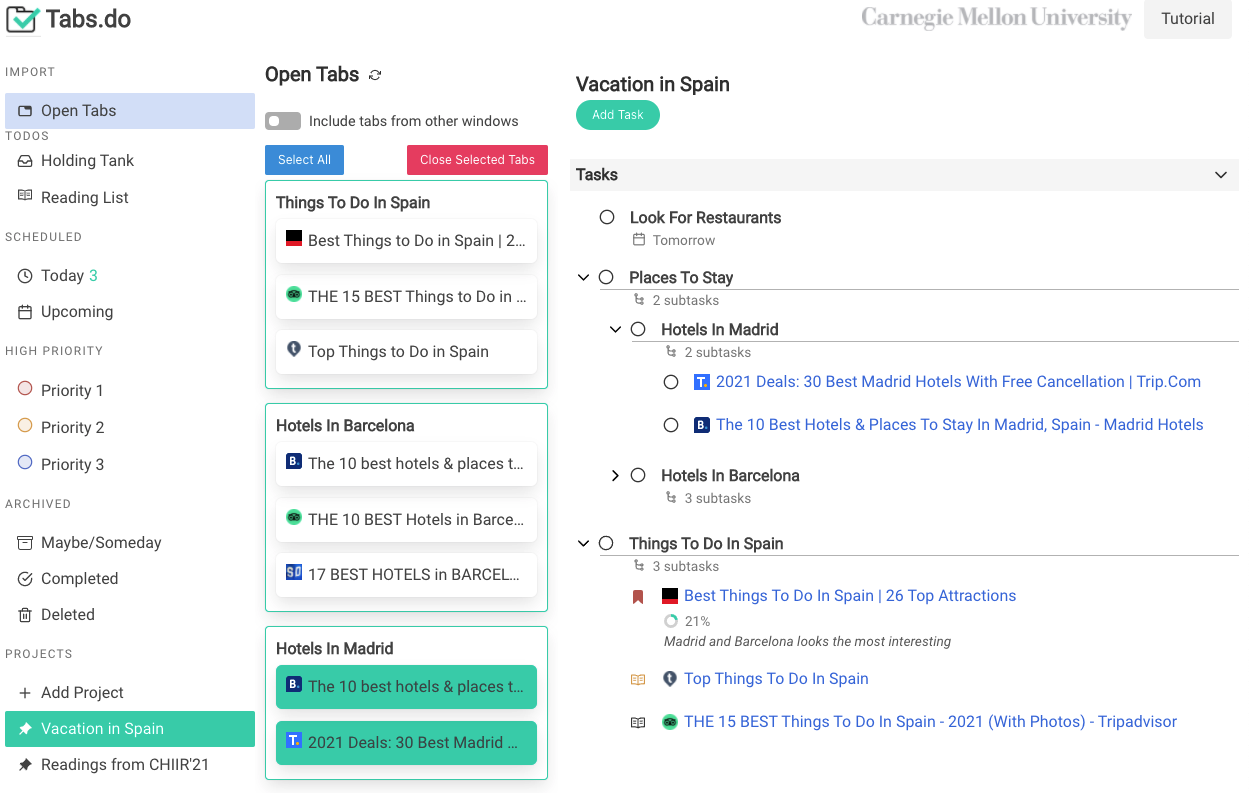
The nature of people’s online activities has gone through dramatic changes in past decades, yet browser interfaces have stayed largely the same since tabs were introduced nearly 20 years ago. The divide between browser interfaces that only provide affordances for managing individual tabs and users who manage their attention at the task level can lead to an “tab overload” problem. We explored a task-centric tab manager called which enables users to save their open tabs to manage them with task structures and affordances that better reflect their mental models. To lower the cost of importing, Tabs.do uses a neural network in the browser to make suggestions for grouping users’ open tabs by tasks.
Abstract
The nature of people’s online activities has gone through dramatic changes in past decades as significant portions of our productivity and sensemaking tasks continue to migrate to “the cloud,” yet browser interfaces have stayed largely the same since tabs were introduced nearly 20 years ago. The divide between browser interfaces that only provide affordances for managing individual tabs and users who manage their attention at the task level can lead to serious adverse effects – commonly referred to as “tab overload.” This paper explores the design of a task-centric tab manager called Tabs.do, which enables users to import and close their open tabs to manage them as tasks. Users can structure and prioritize their tasks to better reflect their mental models and resume progress by reopening tasks into open tabs. To lower the cost of importing, Tabs.do uses machine learning to make intelligent suggestions for grouping users’ open tabs into task bundles with high precision by exploiting behavioral and semantic features. Tabs.do bridges the gap between current browser designs that treat tabs as stacks of independent webpages and users who manage their workflow and attention at the tasks level. We conducted a field deployment study where participants used Tabs.do with their real-life tasks and tabs in the wild and uncovered insights around the costs, benefits, and limitations of a task-centric approach to tab management.
30 Seconds Preview (UIST 2021)
Presentation (UIST 2021)
Downloads
PDF Download ACM Digital Library
Media Coverage
- Mashable: Stop trying to work in multiple browser tabs. It’s terrible for your focus.
- Fast Company: The twisted psychology of browser tabs—and why we can’t get rid of them
- Make Use Of: 5 More Chrome Extensions to Manage the “Too Many Tabs” Problem
- MetroNews UK: Suffer from “tab overload”? Scientists study why we have so many open
- Inc.: Stressed Out by Your 87 Open Browser Tabs? New Science Offers a Fix
- HackerNews: When the Tab Comes Due: Challenges in the Cost Structure of Browser Tab Usage
- HackerNews: Overcoming tab overload
- Science Alert: We’re Getting Buried in Browser Tabs And Scientists Want to Fix It
- EurekAlert: Overcoming tab overload
- NewsGram: Skeema: This Tool Will Assist You In Managing Your Browser Tabs More Effectively
- Sify: This tool can help you better manage browser tabs
- Revyuh: Browser Tabs: Scientists Find New Way to Overcome Fear of Black Hole Effect
- Carnegie Mellon University: Overcoming Tab Overload
Citation
1 2 3 | |
Bibtex
1 2 3 4 5 6 7 | |